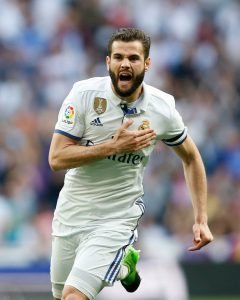Nacho has been playing with diabetes since he was 12 years old.
Every day during meals, Nacho takes out a new syringe and injects insulin. He always has a saccharometer in his bag, and in the notes on his smartphone he keeps a list of foods he is not allowed to eat, which he checks against in the cafeteria.
Nacho has been following these rules since he was 12 years old.

Then he suddenly got sick while preparing for a tournament. “I was constantly running to the bathroom, drinking liters of water,” recalls Nacho, who by then had been living in a boarding school for two years and had hardly been sick. – My mother was very worried because I was going to a five-day tournament. She called the hospital and we went for a checkup. Several tests showed the boy’s blood sugar levels were off the charts. It was diagnosed as type 1 diabetes.
Nacho still remembers the shock and fear that overwhelmed him after the news. After all, the doctor said he would have to stop playing soccer. “Imagine what a 12-year-old child experienced when he was told that. It was horrible, the collapse of my dreams. We came home and I had the worst weekend of my life,” Nacho recalled.
There was faint hope for another doctor – he left on Monday. “I was seen by our family doctor, his name is Ramirez. The only thing I wanted to hear from him was that I could play soccer after all. It went even better: he said I just needed to play sports. I was happy, even if I had to watch myself three times more carefully.
At first the partners looked at Nacho suspiciously: they were unaccustomed to his teammate injecting himself regularly. But he calmly talked about his illness. Soon everyone offered to help him.
Diabetes forces Nacho to be very careful. Doctors only make sure that blood sugar levels do not fall during training, and the footballer has to remember about the diet and injections himself. However, he even finds the pluses in this: “When you do sports, all the inconveniences associated with illnesses are somehow easier to bear. It’s even helped me in my career. Proper nutrition and rest are essential for a high-class athlete, and because of my diabetes, there are no restrictions on my workload. I even try to do more than others. If you control everything, there is no problem. Maybe that’s why I’ve never had any serious injuries.”
Nacho made his debut for Real Madrid under Mourinho when he was 21. “Then my dream came true. I tried for so many years to break into the first team, and I’m very grateful to Mourinho for giving me the chance,” he said. After that game, Nacho did return to Castilla, but never left the Real Madrid system. “Naturally, there were periods of doubt. Every offseason there were thoughts of playing where I was more trusted. But I stayed loyal to the club. In the summer of 2016, when I was actively called for Roma, I renewed my contract for another year because the club and the new coach wanted it. And I did the right thing.
That coach was Zidane. Under him the defender had the best year of his career, playing 38 official matches, and he has moved to a new status, which Zidane himself sealed at one of his press conferences: “Nacho is important for us. He’s a classy, versatile defender who can do a lot of things.
Even in this UEFA Champions League, Nacho played six full games, and in the final he replaced the injured Dani Carvajal: “Liverpool have three great players up front: Salah, Mané and Firmino will cause a lot of problems with their speed and goalscoring. But we won’t falter and we know how to stop them.”
Nacho is Real Madrid’s most humble and inconspicuous hero. He was born near Madrid, in Alcalá de Henares, a city of 200,000 people, and he likes the place so much that he still hasn’t moved to the capital. “At home, close to family and close friends, I’m happy. Yes, I play for one of the best clubs in the world, but it hasn’t changed my life. I still go out with my wife and kids, go downtown to have drinks with friends. Everything is just fine.”
Nacho is now 28 years old, and it looks like he will never be a superstar. But Real Madrid fans don’t expect much from him. “I’m happy to play at the club I love, and I want to finish my career there,” he is prized for this dedication and humility in the first place. After all, he’s fighting for the club despite an illness that could easily sideline even the bravest person, let alone a 12-year-old child.
“I know diabetes is with me for the rest of my life. Although … they can find some kind of cure, can’t they? I’m used to it by now, though. Sometimes it feels like there’s always a partner wandering around with me. But I can also take a break from it: if there’s a break from soccer, I cycle, do duathlons and triathlons. Diabetes doesn’t stop me from doing what I love.
